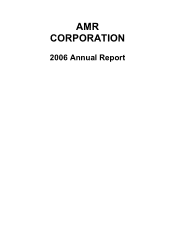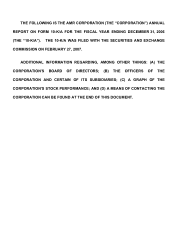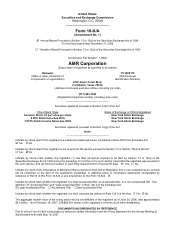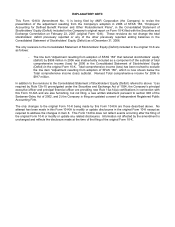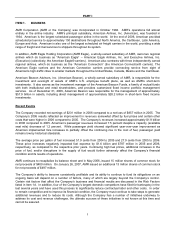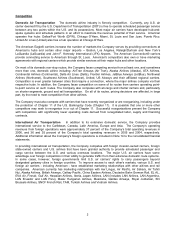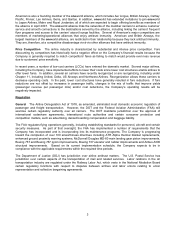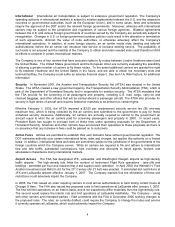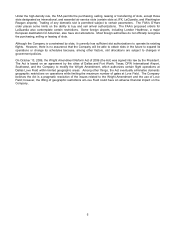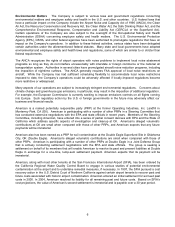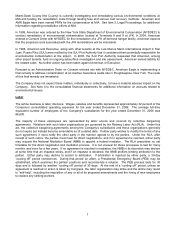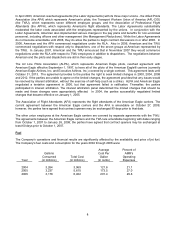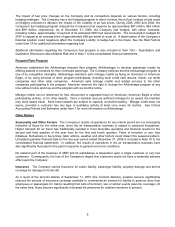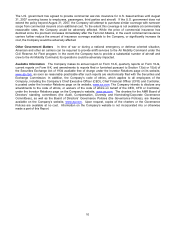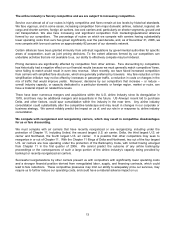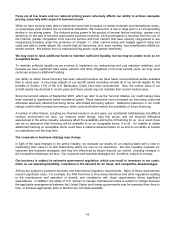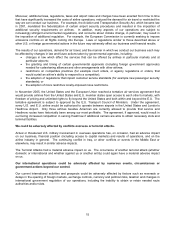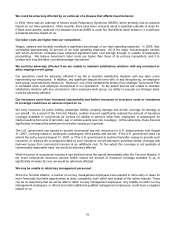American Airlines 2006 Annual Report Download - page 10
Download and view the complete annual report
Please find page 10 of the 2006 American Airlines annual report below. You can navigate through the pages in the report by either clicking on the pages listed below, or by using the keyword search tool below to find specific information within the annual report.6
Environmental Matters The Company is subject to various laws and government regulations concerning
environmental matters and employee safety and health in the U.S. and other countries. U.S. federal laws that
have a particular impact on the Company include the Airport Noise and Capacity Act of 1990 (ANCA), the Clean
Air Act, the Resource Conservation and Recovery Act, the Clean Water Act, the Safe Drinking Water Act, and the
Comprehensive Environmental Response, Compensation and Liability Act (CERCLA or the Superfund Act).
Certain operations of the Company are also subject to the oversight of the Occupational Safety and Health
Administration (OSHA) concerning employee safety and health matters. The U.S. Environmental Protection
Agency (EPA), OSHA, and other federal agencies have been authorized to promulgate regulations that have an
impact on the Company's operations. In addition to these federal activities, various states have been delegated
certain authorities under the aforementioned federal statutes. Many state and local governments have adopted
environmental and employee safety and health laws and regulations, some of which are similar to or stricter than
federal requirements.
The ANCA recognizes the rights of airport operators with noise problems to implement local noise abatement
programs so long as they do not interfere unreasonably with interstate or foreign commerce or the national air
transportation system. Authorities in several cities have promulgated aircraft noise reduction programs, including
the imposition of nighttime curfews. The ANCA generally requires FAA approval of local noise restrictions on
aircraft. While the Company has had sufficient scheduling flexibility to accommodate local noise restrictions
imposed to date, the Company’s operations could be adversely affected if locally-imposed regulations become
more restrictive or widespread.
Many aspects of our operations are subject to increasingly stringent environmental regulations. Concerns about
climate change and greenhouse gas emissions, in particular, may result in the imposition of additional regulation.
For example, the European Commission is currently seeking to impose emissions controls on all flights coming
into Europe. Such regulatory action by the U.S. or foreign governments in the future may adversely affect our
business and financial results.
American is a named potentially responsible party (PRP) at the former Operating Industries, Inc. Landfill in
Monterrey Park, CA (OII). American is participating with a number of other PRPs in a Steering Committee that
has conducted extensive negotiations with the EPA and state officials in recent years. Members of the Steering
Committee, including American, have entered into a series of partial consent decrees with EPA and the State of
California which address specific aspects of investigation and cleanup at OII. American’s alleged volumetric
contributions at OII are small when compared with those of other PRPs, and American expects that any future
payments will be immaterial.
American also has been named as a PRP for soil contamination at the Double Eagle Superfund Site in Oklahoma
City, OK (Double Eagle). American's alleged volumetric contributions are small when compared with those of
other PRPs. American is participating with a number of other PRPs at Double Eagle in a Joint Defense Group
that is actively conducting settlement negotiations with the EPA and state officials. The group is seeking a
settlement on behalf of its members that will enable American to resolve its past and present liabilities at Double
Eagle in exchange for a one-time, lump-sum settlement payment. American expects that its payment will be
immaterial.
American, along with most other tenants at the San Francisco International Airport (SFIA), has been ordered by
the California Regional Water Quality Control Board to engage in various studies of potential environmental
contamination at the airport and to undertake remedial measures, if necessary. In 1997, the SFIA pursued a cost
recovery action in the U.S. District Court of Northern California against certain airport tenants to recover past and
future costs associated with historic airport contamination. American entered an initial settlement for accrued past
costs in 2000. In 2004, American resolved its liability for all remaining past and future costs. Based on SFIA’s
cost projections, the value of American’s second settlement is immaterial and is payable over a 30 year period.

